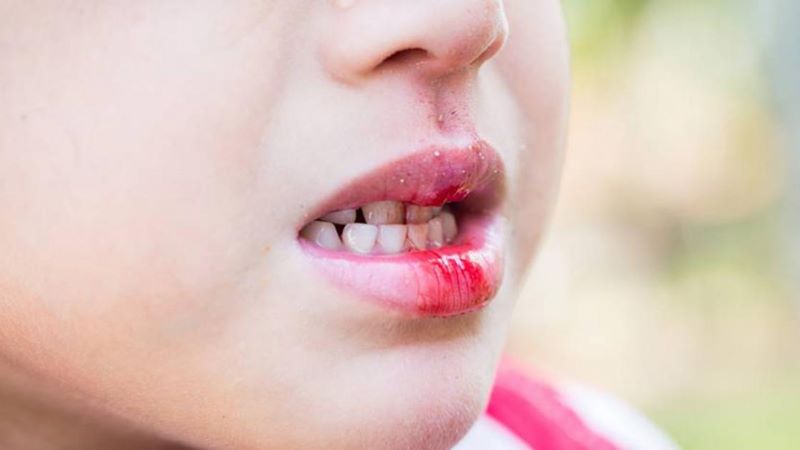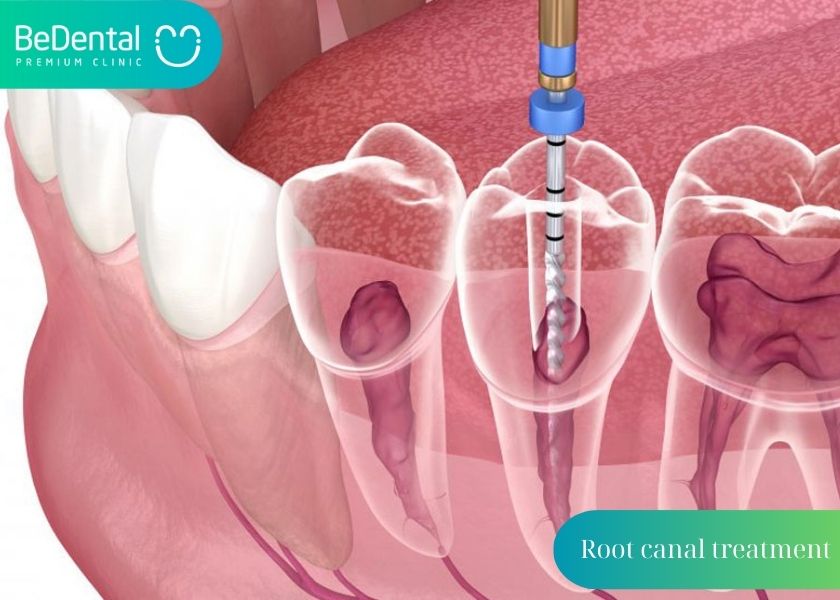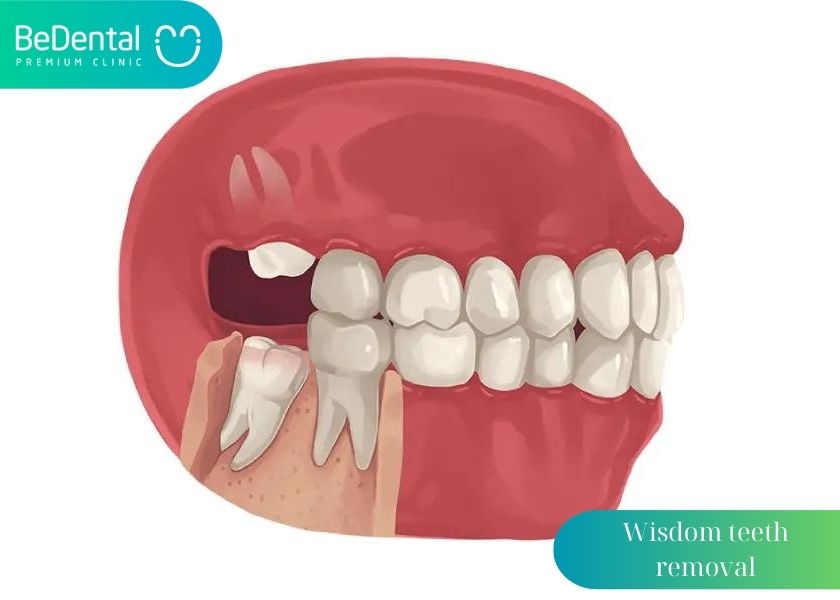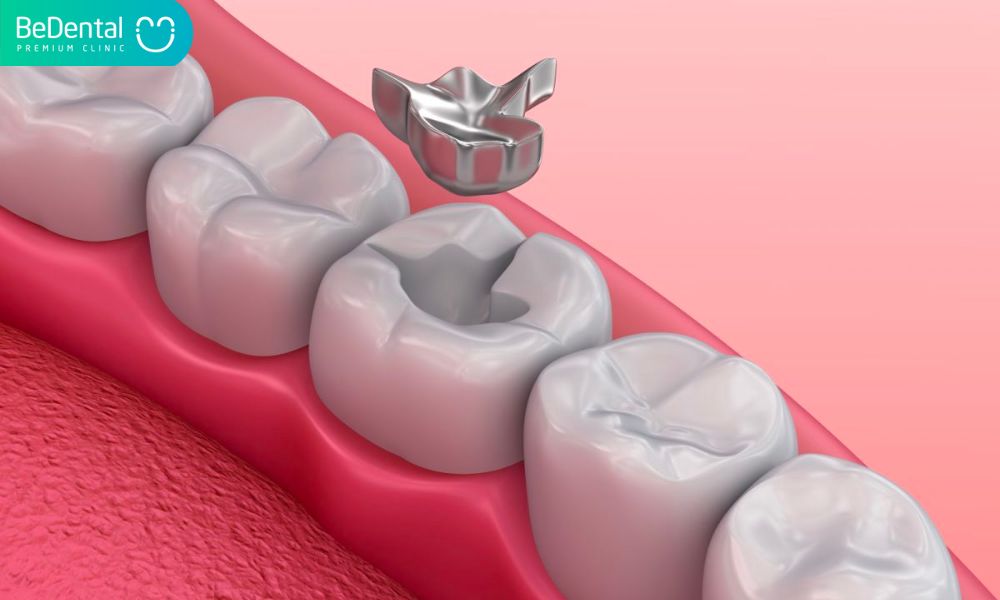Sucking the lower lip in children is a condition where a child holds (sucks) their lower lip tightly between their jaws unconsciously. This is considered a bad habit and is common in both adults and children.
Although it may seem harmless, it carries risks to the child’s aesthetics and future health. Therefore, this phenomenon needs to be controlled, prevented, and adjusted by parents to avoid future impacts.
1) Causes of children suck the lower lip
Sucking the lower lip is a common behavior in young children, especially in children from 6 months to 2 years old. There are several causes of children suck the lower lip:
- Innate habit: Children naturally like to suck their lower lip because it is a natural habit for them to develop through motor skills and self-exploration.
- Seeking safety: Young children always crave a sense of safety and tranquility, so sucking the lower lip can be a way to seek this feeling. This action provides additional comfort and security for the child.
- Emotional response: Most young children like to suck their lower lip as a way to express their emotions, excitement, or interact with those around them. It is part of the child’s social communication process.
- Reducing stress and fear: Sucking the lower lip may be a way for young children to reduce stress and fear in unfamiliar or challenging situations.
- Teething: Children will have a habit of Sucking their lower lip during the teething process. This action helps alleviate stress and discomfort from the teething process.
- Early habits
- Feeling nervous, anxious, and stressed
- Unconscious behavior
- Child’s own way of entertainment

2) Signs of children frequently sucking the lower lip:
The habit of sucking the lower lip in children is easy to recognize. Through visual observation, parents can easily notice when the child tightly holds their lower lip between their two jaws. This requires parents to spend a significant amount of time during the day to observe their child’s behavior.
In some cases, parents may accidentally come across this behavior. However, it is necessary to spend more time monitoring the frequency of this action in order to draw conclusions.
Here are some common reasons why young children often enjoy sucking their lower lip:
- Frequent lower lip sucking: Young children may suck their lower lip continuously for extended periods without stopping.
- Rubbing the lip with the hand: Young children may use their hand to rub or squeeze their lip while sucking the lower lip, and sometimes both hands participate in this action.
- Frequently placing a finger on the lip: Young children often have a habit of putting their finger on their lip to suck or poke the lower lip.
- Impaired speech: Sucking the lower lip can affect language development and communication. Young children may have difficulty speaking correctly or have an unusual tone when speaking.
- Frequently sucking the lower lip in different situations: Young children may suck their lower lip when relaxing or feeling anxious while studying or facing new situations.
- When feeling stressed, anxious, or unsafe: Sucking the lower lip can help young children alleviate stress and anxiety or increase reassurance in unsafe or anxious situations.
3) Dangerous complications:
At first glance, sucking the lower lip may seem harmless and have no impact, but in reality, it can leave extremely serious consequences. Specifically:
- Simpact on teeth and jaw: If a young child sucks their lower lip strongly and frequently for a long time, it will exert pressure on the teeth and jaw. This can lead to misalignment in the development of teeth and jaw, which may cause issues such as bleeding gums, loose teeth, or asymmetrical jaw.
- Impact on gums: Sucking the lower lip creates a moist and bacteria-rich environment in the oral cavity. This increases the likelihood of experiencing oral health problems, including tooth decay, gum inflammation, and swollen oral mucosa.
- Impact on language development: If a young child continuously sucks their lower lip for an extended period, it can affect their language development and language reflexes. This behavior can hinder their ability to speak fluently and communicate effectively.
- Psychosocial impact: If the habit of sucking the lower lip repeats and is not corrected in a timely manner, it can lead to social isolation. The child may become shy and have a different attitude compared to other children, negatively impacting their development and social integration.
- Malocclusion
- Protruding front teeth
- Painless bite
- Incorrect pronunciation
- Injured lips that easily bleed

4) Lip sucking can cause malocclusion.
Lip sucking can be the secondary cause of malocclusion or it can also be the secondary cause due to improper upper jaw or asymmetry from front to back. The habit of lip sucking can cause permanent malocclusion if the child maintains this habit at an average but continuous and prolonged level.
Children can suck on their upper lip or lower lip, causing different clinical symptoms, but it is more common for children to suck on their lower lip. These changes can occur in both primary and permanent teeth.
Children who suck on their lower lip have their lower lip tucked between the upper and lower incisors, causing the upper incisors to protrude onto the lower lip, increasing the muscle force in the jaw area. This habit is difficult to change and can cause crescent-shaped injuries on the lower lip.
These injuries can crack and become easily infected. It is possible to have an open bite in the incisor region (but to a much lesser extent than when sucking on fingers). The upper incisors tilt towards the lip, the lower incisors tilt towards the tongue and become crowded, causing a large overjet; underdeveloped lower jaw bone leads to a concave facial profile.
Children who have the habit of sucking or biting their upper lip often combine it with pushing their lower jaw forward, causing reverse malocclusion.
To diagnose the habit of lip sucking, a clinical examination and questioning of the parents, especially the caregiver, are necessary. Children often suck their lips unconsciously, such as during sleep, while studying, listening to music or watching movies, reading comic books, etc.
Therefore, dentists need to be very observant when observing children. Even when children are sitting and waiting for their turn to be examined or when they are playing, we need to observe them to recognize their habit of lip sucking. The duration and frequency of lip sucking help dentists predict the ease or difficulty of re-educating the lip movements.
5) Care for young children who suck their lower lip
When young children suck their lower lip, you should apply the following methods to help them:
- Monitor and identify the behavior: Monitor and identify when young children suck their lower lip to understand the situation and the reasons behind this behavior.
- Talk and establish habits: Take the time to talk to the child about the habit of sucking their lower lip. Explain to the child why this behavior is unsafe and work with the child to find alternative measures that can meet their needs.
- Provide alternative measures: Provide the child with simple alternative measures such as sucking on their finger, sucking on candy, using a sippy cup, or providing toys to help the child focus on the toy instead of sucking their lower lip.
- Encourage and praise: When the child does not suck their lower lip while implementing alternative measures, encourage and praise the child. This helps motivate the child to continue with positive behaviors.
- Create a safe environment: Create a quiet, clean, and safe environment around the child. This helps reduce stress and anxiety, thereby reducing the child’s habit of sucking their lower lip.
- Support from the family: Love and support from the family are essential. Create a friendly and safe environment to reduce unnecessary stress and anxiety for the child.
- Seek advice from family professionals: If the child’s habit of sucking their lower lip does not decrease after a long period of time or creates psychological stress and pressure between the child and the family, seek advice from a pediatrician or child psychologist for specific advice and support.
- Explain and show the child illustrations of the harmful effects of this habit.
- Regular reminders and observations of the child.
- Avoid continuous scolding, to avoid psychological pressure on the child.
- Find alternatives and games to distract the child from this bad habit.
- Take the child outside to play and interact with other people to distract them from this bad habit.
- Coordinate with others to advise the child.
- Take the child to a specialized dentist or psychologist for advice and oral health examination.
6) Prevention of lip sucking for children
To prevent lip sucking for children, you should consider the following methods:
- Create a comfortable environment: Provide a quiet, safe, and healthy environment for the child to reduce stress and anxiety. This will help the child feel comfortable and not resort to lip sucking to relieve stress.
- Provide alternative comforting methods: When young children have a need for comfort, provide alternative methods such as allowing the child to hold a small object and suck on their finger or a pacifier or sucking on a lollipop to fulfill their need for oral stimulation.
- Manage stress levels: Be aware of early signs of stress in children and provide them with stress reduction techniques, including engaging in relaxation activities such as gentle massage or deep breathing techniques.
- Oral hygiene awareness: Protect the child’s oral cavity by maintaining daily oral hygiene practices, such as proper toothbrushing and regular dental check-ups to monitor and clean the mouth.
- Create a healthy environment: Encourage the child to participate in healthy activities and create a healthy learning and playing environment. This helps the child engage in healthy activities instead of lip sucking.
- Identify and address emotional causes: If the child’s lip sucking behavior is linked to stress or emotions, identify the emotional causes and try to help the child address their emotions in a healthy way through communication, support, and relaxation. Use alternative rules: In some cases,
- Teach the child about the harmful effects of this habit.
- Regularly take the child for dental check-ups to monitor oral health and development.
- Proactively create good habits for the child to keep them occupied and not focused on the bad habit.
- Regularly communicate with the child.
- Teach the child how to protect oral health and the importance of it.
- Remind the child about the bad habits and their consequences.

7) How to treat a child’s lip sucking
Treatment for a child’s lip sucking: Practice to break the habit or intervene with a lip bumper device. Effective treatment requires close coordination between the family and the dentist.
The dentist needs to clearly explain to the child and the family the consequences of lip sucking behavior and the role of having healthy, beautiful teeth so that the child is aware that they need to break this habit.
If the child is aware and willing to practice and accept wearing intervention devices, the treatment for a child’s lip sucking will yield good results. However, if they do not cooperate and refuse to wear the devices at home, they may remove or hide them without the parents’ knowledge.
Therefore, the family needs to pay attention to the child, remind them, and encourage them to voluntarily wear the device and not continue lip sucking. The dentist, as well as the parents, should have motivating measures and rewards to encourage the child to be determined to give up these bad habits.
Tư vấn chuyên môn bài viết:
BÁC SĨ DƯƠNG THỊ THÙY NGA
BEDENTAL - TOP STANDARD DENTISTRY SYSTEM
In HANOI
Address 1: 7B Thi Sach St, Ngo Thi Nham, Hai Ba Trung Dist, Ha Noi. - 0934.61.9090
Address 2: 343 Tay Son St, Nga Tu So Ward, Dong Da Dist, Ha Noi. (Nga Tu So Cross) - 0934.61.9090
Address 3: CC2 Tower Nguyen Huu Tho St, Dinh Cong Ward, Hoang Mai Dist, Ha Noi. (Inside True Hope ) - 0934.61.9090
In HO CHI MINH
Address 1: 53 -55 -57 Pho Duc Chinh St, Nguyen Thai Binh, Dist. 1, Ho Chi Minh. - 0766.00.8080
Address2: 25, City Land urban area, Go Vap Dist, Ho Chi Minh - 0766.00.8080
Working: 9am - 6pm everyday
Website: https://bedental.vn/en/







